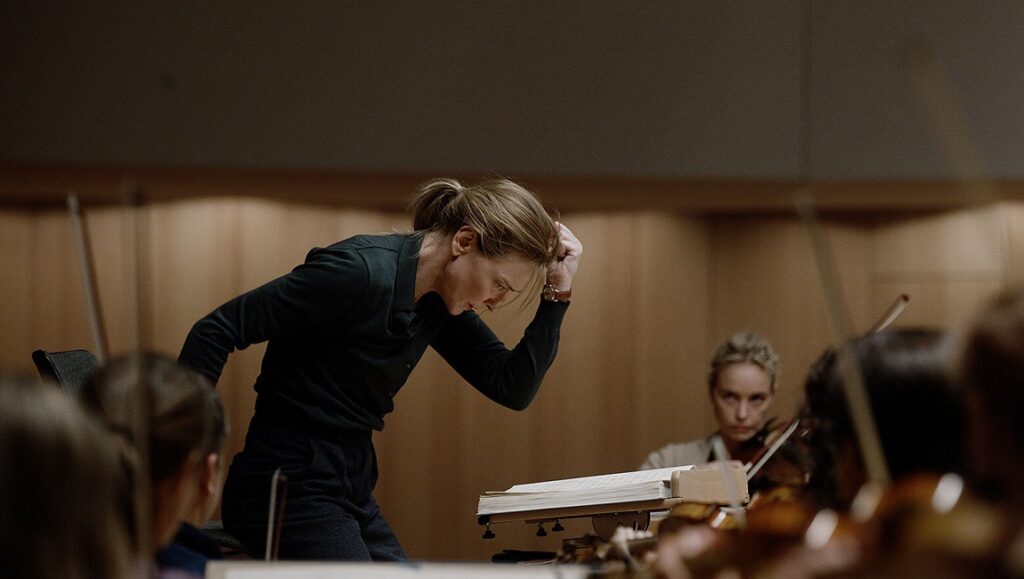TÁR raises plenty of fascinating questions, but Field unfortunately proves more interested in depicting the luridness of their specific context here than he does in exploring them with much substance or daring.
The first scene of Todd Field’s TÁR sees its eponymous lead character (Cate Blanchett) in conversation with The New Yorker’s Adam Gopnik (playing himself). As expected, the scene provides us with some basic information about the one and only Lydia Tár: We learn that she is a world-renowned musician and the current conductor of the Berlin Philharmonic; that she is married to the orchestra’s concertmaster Sharon Goodnow (Nina Hoss), with whom she has a daughter; that she is an EGOT honoree; and that she has a new book, Tár On Tár, hitting shelves soon. With its flowing conversational rhythms, which at least mimic the syntax of intellectual conversation (or anyway a New Yorker reader’s idea of what that would be), the conversation also defines a strong baseline fidelity to Tár’s rarefied, high-art milieu — a fidelity which Field immediately proceeds to deviate from. The following two scenes, which see Tár flirting with a female admirer after the New Yorker talk and having lunch with a less talented conductor (Mark Strong) who all but begs her to show him her score sheets, play up the contrast between the ostensible propriety of the respective settings and the tawdry substance of the interactions. The contrast is sharpened when we later learn that Strong’s character, who had offered Tár the use of his private jet, rescinds his invitation, as if to even the score after their conversation failed to go his way.
It’s during the scene directly following that lunch, however, that TÁR really starts to show its hand. The setting is a Julliard masterclass on conducting which Tár is invited to teach. The subject is the perennial question of artistic value. And the inciting event is a comment from a self-identified “BIPOC pangender” student Max (Zethphan D. Smith-Gneist), who says that he is unable to appreciate Bach because he was a misogynist. Tár, whose own career has been building to a recording of Mahler’s Fifth Symphony, proceeds to unleash the full force of her authority and learning on Max, who for his part is entirely unequipped to defend his conflation of an artist’s life and the value of their work. There are genuine conversations to be had about how questions of canonicity and classical music conservation intersect with histories of racism and sexism: It is not incidental that the Julliard class begins with Max having chosen to conduct an atonal piece, a decision Tár questions not just because she considers it to be wretched, but also because it seems to obviate the role of the conductor. Field, though, is ultimately less interested in these questions than in entertaining us with Tár’s monologue. And to that extent he succeeds. The entire sequence, shot in one take, moves like a comedy routine, with Tár firing off line after withering line in quick succession. Within the film, the atonal versus classical music debate amounts to little more than an amusing talking point.
Indeed, TÁR as a whole works to introduce about as many talking points as possible, bringing up sundry variations of the relationship between art and personality. When Tár has lunch with her mentor Andris (Julian Glover), a story about orchestra politicking between two men during the post-war deNazification period leads to an on-point punchline: “Who was the better composer?” Similarly, Schopenhauer is introduced in dialogue mainly to incorporate yet another question about how a person’s life relates to their work. The film’s leisurely 158-minute runtime makes ample room for a range of procedural specifics, but Field’s selectiveness about which procedures to actually depict makes it difficult to see TÁR as a complex character study within a scrupulously detailed milieu. The film is, for instance, far less interested in the actual workings of the Berlin Philharmonic than in detailing how Tár undermines these procedures, violating the orchestra’s blind auditions and advancing the career of a new young cellist, Olga (Sophie Kauer), whom she becomes attracted to. Field’s procedural eye does not extend, either, to the legal deposition Tár attends after a former mentee, Krista Taylor, commits suicide and allegations of abuse circulate in the media. Ultimately, Field’s perspective on its milieu and lead character is more analogous to, say, Alex Ross Perry’s Listen Up Philip (2014) than to Ted Fendt’s Classical Period (2018).
To be clear: that last statement is not intended to ground a value judgment, but to clarify Field’s approach. And to his credit, it is a superb joke that the film’s setting turns out to be not the world of classical music but the world of marketing. TÁR is in fact much closer in spirit to the lurid, manipulative, mean-girl rivalries of Brian De Palma’s Passion (2012) than its cold surfaces might initially suggest. More representative than the opening scene with Gopnik is the one where Tár pets Olga in full view of her wife and the entire orchestra. To the extent that the film is really “about” anything, it is about the question of whether there is such a thing as an “objective” artistic judgment. And Field’s decision to take this quandary into camp/exploitation territory, using #MeToo and “cancel culture” talking points somewhat opportunistically, is no fault in itself. (The approach yields such pleasures as the sight of Blanchett’s Tár threatening a six-year-old girl in German.) The trouble is that he does not, in the end, take any genuine risks. TÁR features some psycho-horror tropes à la Darren Aronofsky’s Black Swan (2010), but Field mainly uses these to flatten and obfuscate at every turn. Indeed, Field takes such a coyly suggestive approach with everything that by the end, his choice to play the credits in reverse at the beginning of the film starts to look like his most daring move.


Comments are closed.